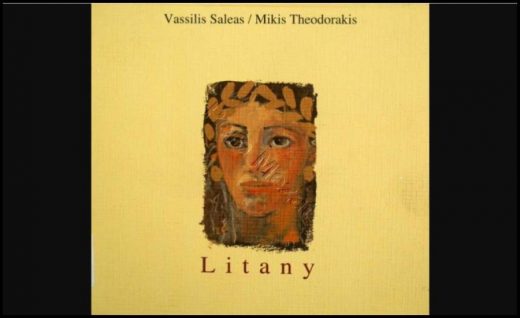The echo that Epitaphos made in the country is famous. Based on Mauthausen, one of the famous Nazi concentration camps, the ‘Mauthausen Ballad’ has been recorded as one of the most beautiful ‘musical works’.
Aegean is a sea of songs; full of the songs of the islands, the coasts, and all the streams that join it. For example, Meriç’s melodies filled with sadness and joy carried the echoes of a broken lyre. This lyre dates back thousands of years; The first known singer-poet of the Aegean is the lyre of Orpheus, the ‘ancestor of poets’. Behind most of the songs lie the broken lyre and bodies of the resisting singer bards.
Orpheus loses to the underworld; Linos with his verses, Marsyas with his pipe, challenge Apollo from the power of Olympos, but they also lose in the face of this god and are brutally murdered. Yes, the tradition of resistance is strong because the ‘Sea of Islands’ has its roots. Undoubtedly, Theodorakis was a contemporary singer-poet who attracted attention not only with his magnificent art, but also with his warlike attitude towards the powerful. As he wrote in the Oropos concentration camp, he was driven to bring the music of his people together with contemporary poetry with the “pressure created by enthusiasm”.
Looking behind…
‘Looking behind’ is a kind of gamble if the rest is dark. When his beloved Eurydice dies from a snakebite, Orpheus, enchanting everything, both living and non-living, with his lyre descends to the underworld (Hades: land of death). The goddess of the underworld affects Persephone so much that Eurydice is allowed to return to earth (to life).
But on one condition: Eurydice will follow him, and he will not look back until he comes back to earth. In the eerie darkness of Hades, Orpheus can’t stand it and looks back, and Eurydice is held there forever. The poet has lost the game in the dark. His loss makes him indifferent to the sunny earth to which he returns alone. In Thrace, where he wanders around singing songs alone, he is torn apart with his lyre by a group of ‘wild ones’ whom he treats indifferently and thrown into Meriç…
Theodorakis, on the other hand, is an artist of a sunny world from beginning to end; His eyes are open to this world from all sides. This includes ‘looking behind’: It examines the evolution of the work (opera) from ancient cultures to the present day, and deals with the rituals of some ‘traditional’ societies of our time with the curiosity of an anthropologist.
His interest in the past is truly remarkable: While he draws attention to the importance of the roots of music in folk and culture, he also criticizes the repetition of traditional folkloric material with a ‘new look’ as ‘museum music’. This emphasis also has a side reminiscent of the bond Adorno established between the museum and the mausoleum. The German thinker described the museum as “a cemetery where works of art are buried”.
Theodorakis pays attention to the place of artistic activity in the material production of culture. In a way, this also points to the awareness that the artistic act is a constant ‘praxis’. The accumulation of the past should not have been a ‘sum of mummies’ hidden somewhere. He also goes to Byzantine music and ‘demotic’ music; His works are proof that he returned from here with a valuable treasure.
From poetry to music…
Theodorakis’ success is based on his reflection on the problems of music. He saw contemporary Greek poetry as a valuable opportunity to overcome the blockage in front of Greek folk music, which he admired. Thus, Theodorakis, who brought modern poetry and music together, gradually improved his works in this direction and transformed the music of his country from this front.
His works, which he called “Cycle” and “Metasymphony”, which are based on poems formed within the framework of a certain theme and each of which creates a wonderful halo in addition to their holistic effects, found various echoes. The new style works that he started with Epitaphos, which he composed on the poetry of Yannis Ritsos, represent different peaks in his music.
Ancient drama poets Euripides, Sophocles, Aristophanes; The list extending from modern Greek poetry to poets such as Kalvos, Sikelianos, Seferis, Elytis, Ritsos, Gatsos, Anagnostakis, Eleftheriou, Kambanellis, Livalitidis and other poets, and from world poetry to poets such as Neruda and Lorca, is also an indicator of the place poetry has in Theodorakis’s heart. According to him: “Poetry was undoubtedly the most advanced of all Greek arts.”
The Sun and ‘To Axion Blow’,,,
There is nothing surprising in the fact that the sun takes the lead in the music and poetry of the Mediterranean and Aegean. But the expression of the sun in the poem of the great Greek poet Elytis is different: “As I often talk about the sun like this/ A big red rose wraps around my tongue/ But it’s hard to keep quiet”. (Ç. H. Millas) It should not be an exaggeration to say that the sun in the poem Elytis had a profound effect on Theodorakis as it did some poets. He also acts as it is in one of the most beautiful parts of both the poem and the oratorio in ‘To Axion Esti’: “The Swallow is unique and Bahar is precious / The sun has to work hard to complete the orbit”
‘To Axion Esti’ has a very important place in the music of Theodorakis as well as in the poetry of Elytis. The resistance spirit of the people met some elements from the depths of Greek history and mythology. It attracted great attention from the public as a poem and as an oratorio, from its recitatives to its hymns. Elytis’ splendid piece was composed expertly and in an unforgettable form. He was calling out to the sun of justice: “Dream sun of justice and you honorable myrtle/ I beg you, do not forget my country! / The mountains have the face of an eagle, the vineyards lined up with volcanoes / the neighborhood of the sea, their houses are white!”
“He sings and fights”
This word he said for his people found a direct response in his own life. His reactions, including some of the excesses created by his Coşkun temperament, were always met with a justified interest and sympathy. Of course, there were aspects to be questioned in his constant emphasis on ‘the people’ and his attitude towards certain problems; Because he didn’t seem to consider many variables when he said ‘people’.
He was right, however, in emphasizing that the Greek people had a vibrant folk music and culture; this was evident in his music as well. He also explored folk elements in the modern music of other countries; It is very important for him to encounter elements of German folk music in composers such as Mozart, Schubert, Brahms, and Russian folk music in composers such as Mussorgsky, Rimsky-Korsakov and Stravinsky.
Music and fighting go side by side. The echo that Epitaphos made in the country is famous. The ‘Mauthausen Ballad’ or ‘Trilogy’, whose story is based on Mauthausen, one of the famous Nazi concentration camps, and which consists of arias, added a valuable ‘note’ to the memory of humanity while being recorded as one of the most beautiful ‘musical works’.
From ‘O Antonis’ to ‘I Remember in September’, from ‘To Axion Esti’ to ‘Canto General’ based on Neruda’s poetry, all of his works also reflect Theodorakis’ exuberant nature. And another gift to his people, who suffered greatly from civil war and fascism: ‘The Song of the Dead Brother’… Let’s end the sibling fight with verses from the ‘Dream’ section of this work, which also deals with references to the Tragic Age, the time of myths, and the quarrel of Pollyneikes and Eteocles:
O mother suffering, you had two sons, two trees, two rivers,
Two Venetian castles, two sprigs of mint, two great joys.
One was from the West side, the other from the East side,
You’re calling out to the lonely sun, asking questions
The sun that sees mountains and rivers…
You who see our suffering, all unfortunate mothers!
If you see Pavlos and Andreas, call me, call me…
I gave birth to them in pain and sobs
Now they are looking for each other to kill,
Far away, on the highest peak of the highest mountain,
They lie side by side, dreaming the same dream…”
(d. L. Behmoaras)
Visits: 67



